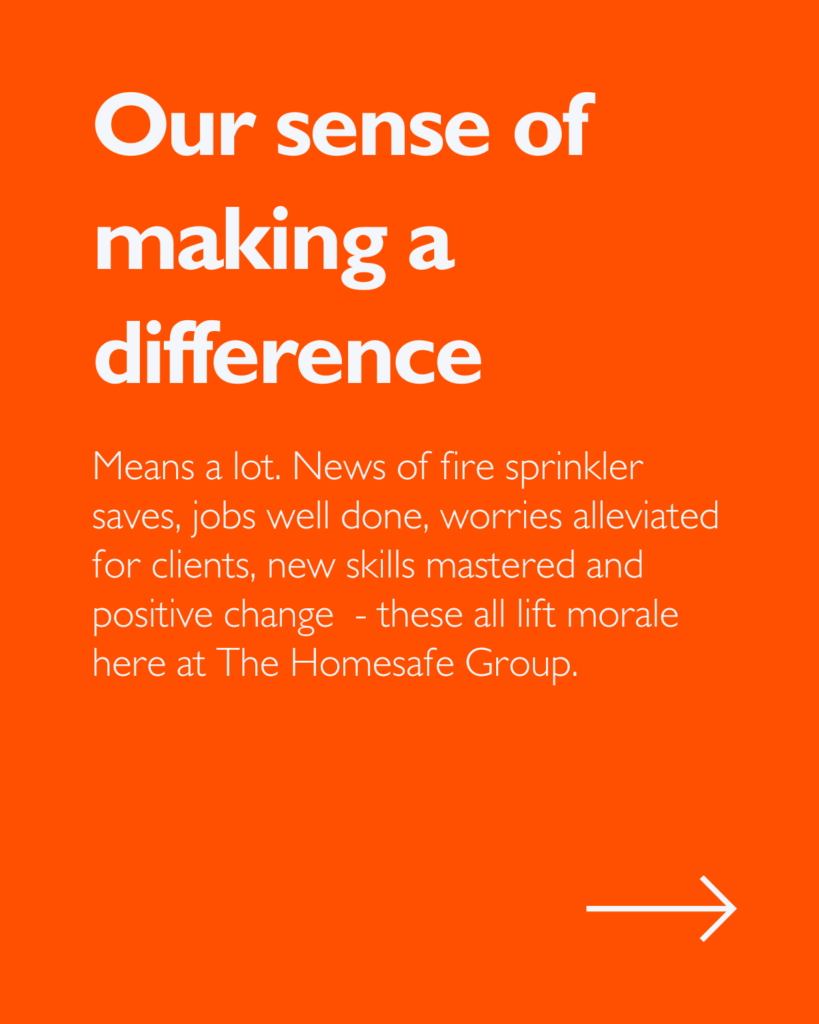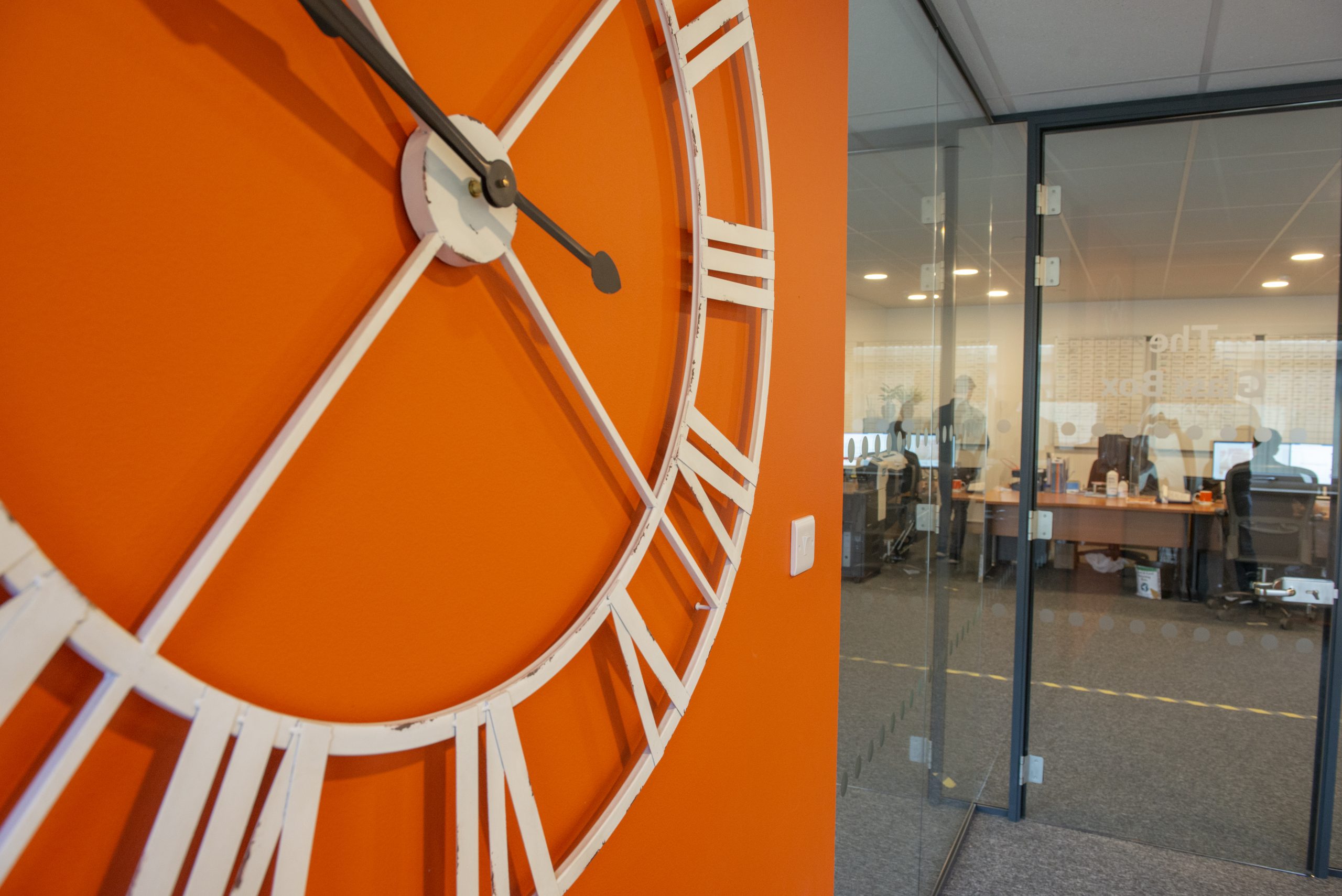
This week is Mental Health Awareness Week, and we focus on kindness, flexibility and team support. We are unusual in the fire sprinkler market for employing our own teams and developing skills in house. 90% of our work is on construction sites – historically not the gentlest places in which to work (but this is changing – mental health first aiders actually exist for construction workers!) and we make sure our office-based colleagues understand the challenges of site, too.
In today’s fast-paced world, maintaining mental health and well-being at work has become increasingly important. In this blog, we explore key tips for achieving mental health and well-being at work, focusing on understanding job demands, seeking support, autonomy, growth, purpose, mental health awareness, and the importance of taking annual leave.

The Universal Nature of Mental Health
No-one is immune to the ups and downs of Mental health – it influences thoughts, emotions, and behaviours within the workplace as well as at home. Acknowledging the role of our mental health is the first step to maintaining a balance between professional demands and personal well-being.
Mental health is critical to our overall health, so an environment where open discussions and actions towards mental well-being is to be encouraged.
In the context of work, understanding that mental health issues do not discriminate and can affect anyone irrespective of their role or status is essential. (Directors and site managers are not exempt, dear reader go gently but assertively when approaching!)

Navigating Job Demands and Workload Management
Grasping the scope of a job’s demands, alongside effective workload management, is a cornerstone for fostering mental health and well-being.
Each one of us is on a journey, with elements of our role fully grasped, whilst other aspects may find us at a professional stretch.
Be kind to yourself when going outside of your comfort zone and seek feedback and support from mentors.
Establishing achievable objectives, organising tasks based on priority, and cultivating open lines of communication with colleagues and managers substantially reduces stress and prevents the risk of occupational burnout.
It remains essential for individuals to identify moments when the workload becomes too much, prompting the need for timely intervention and support.
Through these measures, employees can strike a balance, ensuring productivity does not come at the expense of their mental health and well-being.
Seeking Support During Difficult Times
The certainty of challenging periods in the workplace tests personal resilience and an organisation’s support structures. Initiating conversations with peers, supervisors, or HR can unveil a network of support, offering guidance and resources. Here at The Homesafe Group, we champion personnel support and value our HR management, recognising that our unique resources are our PEOPLE. Our HR Manager’s door is always open and everyone has the work mobile number should they need to reach her, and our Directors are approachable. Personal stress risk assessments are available so we can monitor and work with members of the team who may be at additional risk from stressors. We value our tribe.
Our HR Manager Donna Parkin is especially sensitive to the varying needs of all our team, explaining:
“Consultations are a great way to engage with the team in an open and honest forum, which helps to alleviate any worries during times of change. The informal “open door” approach is something that I have worked at, to develop trust with the team, and maintain ongoing relationships and communication, no matter what the issue. Sometimes, a person to share concerns with, is all it takes.
Supporting a varied workforce, including office based and more peripatetic workers, means offering remote support, over the phone or email. Employees who may be lone workers at times, sometimes need additional support; due to long days, driving and the construction environment, which can lead to mental and physical fatigue. As part of our ongoing efforts to support the team, we continuously review our Mental Health and Wellbeing policies to ensure that we are offering the best possible support.”
We also promote third party helplines should anyone or their family feel the need to reach out day or night. Openness alleviates personal burden and cultivates a culture where mental well-being is prioritised and discussed freely. The act of seeking help is empowering both in itself because action is being taken, but also in the advice that can come our way when we seek it out, adding layers of strength and resilience and enabling a constructive pathway through challenging times.

Autonomy and Mental Wellbeing
Autonomy within the workplace significantly influences mental well-being, offering a sense of control and independence over work-related tasks and decisions. This empowerment fosters a positive work environment, encouraging employees to engage more deeply with their roles.
When individuals experience autonomy, it elevates their motivation and contributes to higher levels of job satisfaction. Employers who recognise the value of independence integrate flexibility into their management styles, allowing employees to navigate challenges and tailor their work paths.
This approach enhances individual performance and promotes a culture where personal growth and professional development are interconnected.
By valuing autonomy, organisations facilitate a supportive atmosphere that recognises and nurtures the unique contributions of each employee, thereby sustaining a healthy balance between professional responsibilities and mental well-being.
We work with Peninsula on our employee support. HR Manager Donna takes up the narrative again:
“Working with an external provider, we offer the team an extensive range of online wellbeing and health and safety training. These courses include; when to be assertive, effective communication and time management. In addition, the management team is committed to training and learning about the needs of employees including; mental health awareness and neurodiversity courses.”
Growth and Excellence as Sources of Fulfilment
Pursuing avenues for personal and professional advancement is pivotal in cultivating a fulfilling work environment. Individuals who identify and seek out growth opportunities not only elevate their job satisfaction but also contribute positively to the overall dynamics of their workplace.
Through continuous learning and embracing challenges, the quest for excellence fosters an atmosphere of achievement and motivation. This journey towards self-improvement and skill enhancement engenders a deep sense of fulfilment.
Such engagement enriches an individual’s career path and bolsters their mental well-being by providing clear objectives and milestones to strive towards.
At The Homesafe Group, we support and facilitate the pursuit of growth and excellence, recognising the intrinsic link between personal achievement and mental health. This is also one of the roles of our Academy.

Finding Purpose and Understanding One’s Mental Health
As we say at induction, you may save a life one day, through your work here. We are proud to be making a difference, and love to hear about sprinkler activations which have helped protect people and property. There were two such instances just last month.
In modern employment, aligning an individual’s purpose with their occupational roles significantly determines mental health and well-being. This synergy between personal values and professional responsibilities instils a sense of meaning and satisfaction in work as a protective barrier against the onset of stress and burnout.
Advocating for a workplace culture that promotes self-awareness and proactive mental health management contributes to a supportive and understanding work environment.
Such an atmosphere nurtures an individual’s career aspirations and safeguards their mental well-being, ensuring a harmonious blend of productivity and personal fulfilment.

The Necessity of Rest and Taking Annual Leave
Even the most fulfilling and rewarding of roles is not enough in itself. You can still have too much of a good thing! The importance of rest periods and holidays within work schedules cannot be overstated. The concept of annual leave, often overlooked in the hustle of meeting deadlines and achieving targets, is critical in safeguarding mental health and enhancing overall well-being. Stepping away from the work environment allows for a much needed disconnect, enabling each of us to recuperate from the cumulative stress and pressures that accompany professional life.
Have a look at your year. At The Homesafe Group, the holiday year runs from January to December, so now is a very good time for our employees to review how they are allocating their leave entitlement. (A kindly hint to colleagues reading this!)
A break from routine should rejuvenate, offering a fresh perspective upon return. We therefore actively encourage everyone to take their annual leave, contributing to a healthier, more balanced workforce. Ultimately, prioritising annual leave is a testament to the understanding that optimum performance is tied to everyone’s physical and mental well-being.
For 2024, we have also introduced a Wellbeing Day – 8 hours to be booked as a full day or in up to 4 2-hourly blocks.
Our management team are aware of the value this can bring, as Donna advocates:
“Offering a Wellbeing Day to all our employees, emphasises the need for the team to consider their mental health as well as their physical health. This day can help someone who might feel burned out at work, under pressure in their personal life or just need some time to clear their head and reset.”
To wrap up, whether you are working at The Homesafe Group or elsewhere: be kind to yourself, balance workload, seek help, find your tribe, take control for what you can and take plenty of breaks.
Suzanne Taylor
Managing Director, Ecotect Engineering Limited, Part of The Homesafe Group
Mental Health Awareness Week 2024 runs from Monday 13 – Sunday 19 May.






